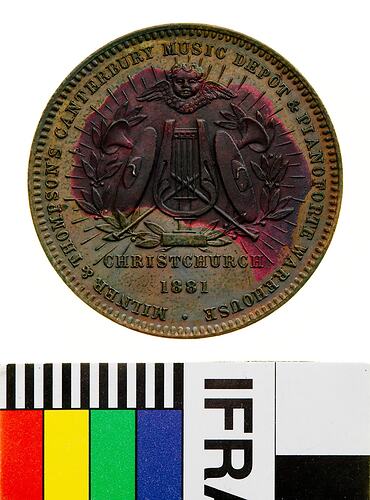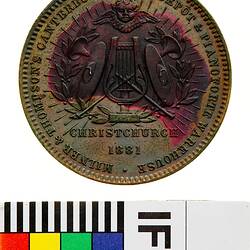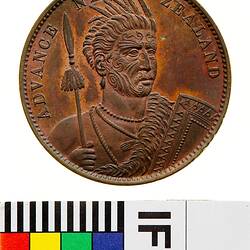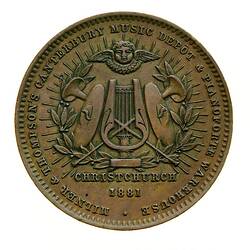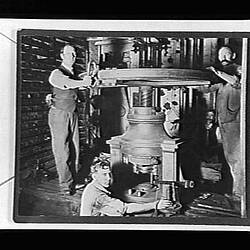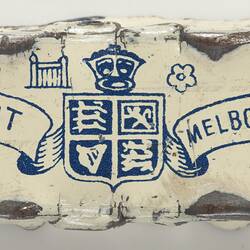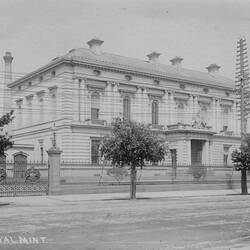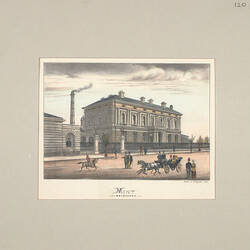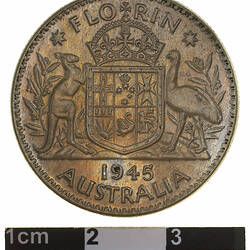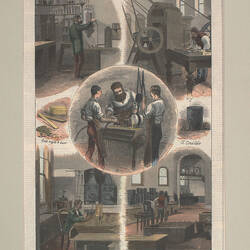Summary
Copper One Penny Token, minted by Stokes & Martin, Melbourne. Issued by Milner & Thompson, Canterbury Music Depot, Christchurch, 1881. Milner & Thompson's Music store, the Canterbury Music Depot, was opened in 1874 by Robert Thompson, some time soon afterwards he took John Milner into partnership and they worked together for 21 years. When Milner retired Thompson continued in the business until he passed it to his sons in 1907. The business was bought by Charles Begg and Co. in 1920, and was still a going concern in 1950. Milner & Thompson were the last issuers of tokens in New Zealand. The firm had a number of novel advertising schemes, in addition to the tokens. They installed a 'phantom piano' on the ground floor, which was set up to give the appearance of being played, while it was in fact being operated from a keyboard and set of pedals installed in the basement below. Thompson also ran a Booking Office for plays from the store from 1881, the first production advertised being staged by the Montague-Turner Opera Co. of Sydney.
Physical Description
A round copper token (34 mm diameter). The token features the name and business of the issuer: Milner & Thompson, Canterbury Music Depot & Pianoforte Warehouse, Christchurch around a group of musical instruments set inside a radiate olive wreath with a winged cherub head set at the top. The reverse features a bust of a Maori warrior facing three-quarters right with tattooed face, wearing a feather headdress and holding a spear in his right hand and shield.
Obverse Description
A group of musical instruments set inside a radiate olive wreath with a winged cherub head set at the top, around, MILNER & THOMPSON CANTERBURY MUSIC DEPOT & PIANOFORTE WAREHOUSE below CHRISTCHURCH / 1881
Reverse Description
Bust of a Maori warrior facing three-quarters right with tattooed face, wearing a feather headdress and holding a spear in his right hand and shield; around, ADVANCE NEW ZEALAND
Edge Description
Plain
More Information
-
Collection Names
-
Collecting Areas
-
Acquisition Information
Transfer from Melbourne Branch of Royal Mint, 11 Jan 1978
-
Date Issued
1881 AD
-
Issued By
Milner & Thompson, Canterbury Music Depot, Christchurch, Canterbury, South Island, New Zealand, 1881
-
Mint
Stokes & Martin, Melbourne, Greater Melbourne, Victoria, Australia, 1881
-
Previous Collection
-
Inscriptions
Obverse: MILNER & THOMPSON CANTERBURY MUSIC DEPOT & PIANOFORTE WAREHOUSE CHRISTCHURCH 1881 Reverse: ADVANCE NEW ZEALAND
-
Denomination
-
Series
-
Material
Copper
-
Axis
12
-
Classification
-
Category
-
Discipline
-
Type of item
-
Dimensions
34 mm (Outside Diameter), 12.436 g (Weight)
-
Shape
Round
-
References
This token belongs to the large (34 mm) diameter Series 1 issue of Milner & Thompson. Two obverse and two reverse dies were employed in manufacturing this series with the two reverses being used together to manufacture an anonymous token. Die identification is the basis of standard references and the museum storage system, they can be identified as follows: Obverse Cherub Head ER & TH A small short ray to & B large long ray to & Reverse 1 Scene of Maori warrior before palm tree 2 Tattoed bust of Maori warrior The following die combinations have been recorded: A/1, B/2 (this token), 1/2 For details of the small (32 mm) diameter series 2 tokens see eg. NU 4127.
[Book] Andrews, Arthur. 1921. Australasian Tokens and Coins., No. 337
[Book] Heyde, Gilbert C. & Skinner, Dion H. 1967. Unofficial Coins of Colonial Australia and New Zealand., No. 178
[Book] Lampard, William H. 1981. Catalogue of New Zealand Coins Tokens Bank Notes., No. 334a
[Book] Humberstone, Vaughn. 2010. Merchants Making Money.
-
Keywords
